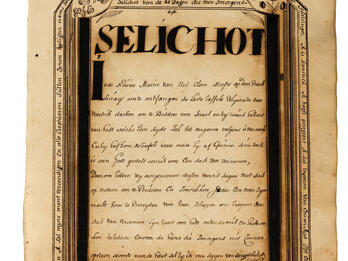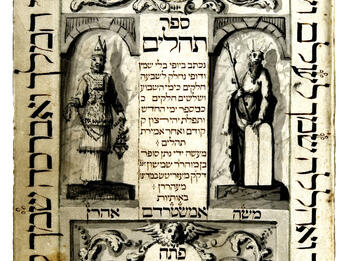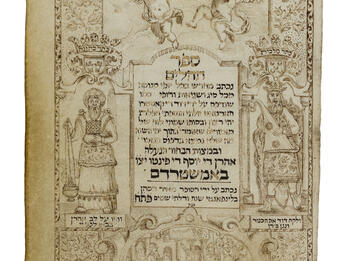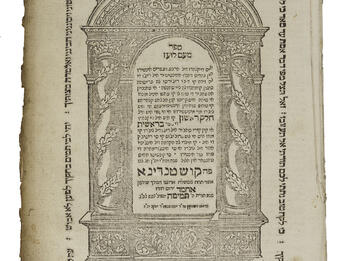Printers’ Preface: Yiddish Translation of Sefer magishe minḥah
With God’s help, we undertook to print the Torah, prophets, and writings with the commentary by Rashi, of blessed memory, and also with a Yiddish commentary, to understand the simple verse as it should be studied and translated according to the meaning from Rashi and the precise connection of the verses. We also collected comments from commentators and midrashim about the verses so that a simple man, who is no great scholar, can also know the contents of our eternal Torah through the Yiddish language. Although a number of holy books on the Torah in Yiddish have already been printed, they either lack the Hebrew text or lack Rashi’s commentary. Thus, we have brought both the Hebrew with Rashi’s commentary so that a scholar can use it and Yiddish for simple people. Never before was such a form seen in the world. Even though a number of editions of the magid have been printed, which are also very useful, the Torah was never printed with the commentary of the magid, nor with the commentary, which we write herein, from all the midrashim and commentators, ordered in a different way and also in a different language—i.e., that commonly spoken—and everyone can understand it as never before.
Therefore, God roused us to undertake such a useful endeavor, which is God’s work, together with the aid of outstanding people, householders, may God preserve them, who supported us in this work and purchased copies by the bundle, may God give them their reward; certainly this will be considered in God’s eyes like bringing an offering [magishe minḥah] of charity, and for this reason we named the book Magishe minḥah. And another reason that we titled it Magishe minḥah is because surely the simple man, who is no great scholar and cannot learn the holy books in the holy tongue, but reads here in the Yiddish language, will find favor before the Holy One, just as when the scholar studies books in the holy tongue. Exactly as the rabbi, the great gaon, our rabbi and teacher Isaiah Halevi, writes in his book The Two Tablets of the Covenant. This we can also learn from the offerings, because we find that the Torah wrote in reference to the offering of a rich man—that is a beast—of a sweet savor unto the Lord; and regarding the offering of a poor man—that is a tenth of a measure of flour meal—of a sweet savor unto the Lord. The Holy One demands from people no more than is in their power [to give]. So too, whoever the Holy One has not endowed with great understanding to study the books in the holy tongue, when he learns here, it is the same as bringing an offering, as though he had brought an offering to the Holy One [ . . . ]. Therefore, we hope that our toil will find favor in the eyes of God and man, for we have spared no trouble and effort, both in translation and in proofreading, as much as it is humanly possible to do. And in the merit of the Torah, may God send us the Messiah, and may our exile come to an end, and may what is written in the Bible come to pass. Amen.
Translated by
.
Credits
Author Unknown, “Printer’s Preface (Yiddish)” in Sefer megishe minḥah, ed. Menachem ben Solomon Amelander and Eleazar Sussman Roedelsheim, vol 1: Bereshit (Amsterdam: Naftali Hirts ben Ziskind Segal, 1725), excerpts.
Published in: The Posen Library of Jewish Culture and Civilization, vol. 5.






